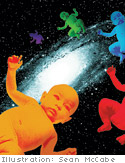
Turns out astrology may not be such a flaky concept after
all.
Are you a supposedly sensible woman who knows not only your sun sign but whether you were born on the cusp? Have you based dating searches on whether you two are a good astrological match? Have you ever, upon learning a new friend's birthday, recoiled and thought, Yikes, a Scorpio?Doctors may soon agree with you: Increasing evidence suggests that the link between birth date and behavior can indeed be explained by the stars—or at least our closest one, the sun. Scientists hypothesize that the amount of light to which mothers are exposed during pregnancy is partly responsible for season-of-birth effects in their offspring. People born in the fall have been found to be more likely to develop panic disorder and/or drug abuse problems; in late winter and early spring to become schizophrenic; and in spring and early summer to have propensities for anorexia, suicide, and dyslexia. According to a review of these epidemiological studies in New Scientist, "the question is no longer if the seasons affect mental health, but how."
One way that sunlight, or the lack of it, may play a role is through its effects on maternal levels of vitamin D (which is synthesized in the skin; its production requires sunlight). "We have good evidence that vitamin D deficiency in early life affects both brain development and behavior in adulthood," says Thomas Burne, PhD, a neuroscientist at Queensland Centre for Mental Health Research, Brisbane, Australia.
He and his colleagues have found that rats deprived of vitamin D in the later stages of fetal development are born with abnormally large lateral ventricles (fluid-filled spaces under the cortex on each side of the brain)—a feature seen in schizophrenic human patients. The rats also showed behaviors related to schizophrenia, including increased locomotor activity and social withdrawal.
Sunlight may affect fetal brain development through its effects on maternal melatonin production as well. Melatonin is produced by the pineal gland, a pea-size organ deep in the brain; its synthesis is suppressed by sunlight. Recent research suggests that beyond helping to regulate the sleep-wake cycle, melatonin may act as an antidepressant. Variations in a mother's melatonin levels could directly affect the brain of the fetus and, in turn, his or her emotional development.
Amateur astrologers will notice similarities between the mental health issues associated with different birth seasons and personality traits traditionally ascribed to the sun signs: an increased risk of schizophrenia in think-outside-the-box Aquarius and visionary Pisces, and of anorexia with food-fixated Taurus.
As season-of-birth effects are studied, Pisces, Virgos, and (gasp) Scorpios shouldn't worry. Like your genes, your sign doesn't automatically mean you're condemned to a lifetime of horror-scopes.
Sunlight may affect fetal brain development through its effects on maternal melatonin production as well. Melatonin is produced by the pineal gland, a pea-size organ deep in the brain; its synthesis is suppressed by sunlight. Recent research suggests that beyond helping to regulate the sleep-wake cycle, melatonin may act as an antidepressant. Variations in a mother's melatonin levels could directly affect the brain of the fetus and, in turn, his or her emotional development.
Amateur astrologers will notice similarities between the mental health issues associated with different birth seasons and personality traits traditionally ascribed to the sun signs: an increased risk of schizophrenia in think-outside-the-box Aquarius and visionary Pisces, and of anorexia with food-fixated Taurus.
As season-of-birth effects are studied, Pisces, Virgos, and (gasp) Scorpios shouldn't worry. Like your genes, your sign doesn't automatically mean you're condemned to a lifetime of horror-scopes.




